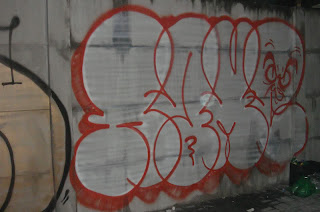you need to looking more graffiti alphabet murals?or just comment my blog..thanks dude :)
|
|---|
Sunday, January 31, 2010
Graffiti characters >> graffiti characters face innocence
you need to looking more graffiti alphabet murals?or just comment my blog..thanks dude :)
Graffiti murals >> graffiti monster jakarta
you need to looking more graffiti alphabet murals?or just comment my blog..thanks dude :)
Graffiti Murals >> the murals vandalism comes
This graffiti art mural seems to be haunting us - just as we commence our series on Indonesian's strange world of graffiti, the murals vandalism comes on with their new 'graffiti art murals' mural-sign
you need to looking more graffiti alphabet murals?or just comment my blog..thanks dude :)
Graffiti alphabet >> graffiti alphabet letters "A"
you need to looking more graffiti alphabet murals?or just comment my blog..thanks dude :)
History of Alphabet | Graffiti Alphabet Letters

History of Alphabet | Graffiti Alphabet Letters. Graffiti alphabet letters with a hand symbol
History and graffiti style alphabet letters AZ began in ancient Egypt. By 2700 BCE Egyptian writing had a set of some 22 hieroglyphs to represent syllables that begin with a single consonant of their language, plus a vowel (or no vowel) to be given by native speakers. This glyph is used as a guide for pronunciation logograms, to write grammatical inflections, and, later, to write down loan words and foreign names.
However, although it seems alphabet in nature, the original Egyptian uniliterals not a system and never used by themselves to encode Egyptian speech. In the Middle Bronze Age apparently "alphabetic" system known as Proto-Sinaitic script is estimated by some to have been developed in central Egypt around 1700 BCE for or by Semitic workers, but only one of the early writings have been described and their properties remains open to interpretation. Based on appearances and names the letter, believed to be based on Egyptian hieroglyphs.
This script eventually developed into the Proto-Canaanite alphabet, which in turn was refined into the Phoenician alphabet. This also developed into the South Arabian alphabet, from which the Ge'ez alphabet (a abugida) are descended. Note that the script mentioned above is not considered feasible alphabet, because they all lack characters representing vowels. Vowelless alphabet is called abjads early, and still in scripts such as Arabic, Hebrew and Syriac.
Phoenix is the first major phonemic script. In contrast to the two writing systems are used extensively at the time, Cuneiform and Egyptian hieroglyphs, each containing thousands of different characters, it is only about two dozen distinct letters, so the script is simple enough for common traders to learn. Another advantage is that the Phoenix can be used to write many languages, because words are phonemically recorded.
This manuscript is spread by Phoenician, which allows Thalassocracy script to be spread throughout the Mediterranean. In Greece, the script is modified to add the vowels, giving rise to the first true alphabet. Greece took the letters do not represent the voices that are in Greek, and change them to represent vowels. This marked the formation of a "true" alphabet, with the presence of two vowels and consonants as explicit symbols in a script. In the early years, there are many variants of the Greek alphabet, a situation that causes many different alphabets evolved.
However, although it seems alphabet in nature, the original Egyptian uniliterals not a system and never used by themselves to encode Egyptian speech. In the Middle Bronze Age apparently "alphabetic" system known as Proto-Sinaitic script is estimated by some to have been developed in central Egypt around 1700 BCE for or by Semitic workers, but only one of the early writings have been described and their properties remains open to interpretation. Based on appearances and names the letter, believed to be based on Egyptian hieroglyphs.
This script eventually developed into the Proto-Canaanite alphabet, which in turn was refined into the Phoenician alphabet. This also developed into the South Arabian alphabet, from which the Ge'ez alphabet (a abugida) are descended. Note that the script mentioned above is not considered feasible alphabet, because they all lack characters representing vowels. Vowelless alphabet is called abjads early, and still in scripts such as Arabic, Hebrew and Syriac.
Phoenix is the first major phonemic script. In contrast to the two writing systems are used extensively at the time, Cuneiform and Egyptian hieroglyphs, each containing thousands of different characters, it is only about two dozen distinct letters, so the script is simple enough for common traders to learn. Another advantage is that the Phoenix can be used to write many languages, because words are phonemically recorded.
This manuscript is spread by Phoenician, which allows Thalassocracy script to be spread throughout the Mediterranean. In Greece, the script is modified to add the vowels, giving rise to the first true alphabet. Greece took the letters do not represent the voices that are in Greek, and change them to represent vowels. This marked the formation of a "true" alphabet, with the presence of two vowels and consonants as explicit symbols in a script. In the early years, there are many variants of the Greek alphabet, a situation that causes many different alphabets evolved.
History of Alphabet | Graffiti Alphabet Letters

History of Alphabet | Graffiti Alphabet Letters. Graffiti alphabet letters with a hand symbol
History and graffiti style alphabet letters AZ began in ancient Egypt. By 2700 BCE Egyptian writing had a set of some 22 hieroglyphs to represent syllables that begin with a single consonant of their language, plus a vowel (or no vowel) to be given by native speakers. This glyph is used as a guide for pronunciation logograms, to write grammatical inflections, and, later, to write down loan words and foreign names.
However, although it seems alphabet in nature, the original Egyptian uniliterals not a system and never used by themselves to encode Egyptian speech. In the Middle Bronze Age apparently "alphabetic" system known as Proto-Sinaitic script is estimated by some to have been developed in central Egypt around 1700 BCE for or by Semitic workers, but only one of the early writings have been described and their properties remains open to interpretation. Based on appearances and names the letter, believed to be based on Egyptian hieroglyphs.
This script eventually developed into the Proto-Canaanite alphabet, which in turn was refined into the Phoenician alphabet. This also developed into the South Arabian alphabet, from which the Ge'ez alphabet (a abugida) are descended. Note that the script mentioned above is not considered feasible alphabet, because they all lack characters representing vowels. Vowelless alphabet is called abjads early, and still in scripts such as Arabic, Hebrew and Syriac.
Phoenix is the first major phonemic script. In contrast to the two writing systems are used extensively at the time, Cuneiform and Egyptian hieroglyphs, each containing thousands of different characters, it is only about two dozen distinct letters, so the script is simple enough for common traders to learn. Another advantage is that the Phoenix can be used to write many languages, because words are phonemically recorded.
This manuscript is spread by Phoenician, which allows Thalassocracy script to be spread throughout the Mediterranean. In Greece, the script is modified to add the vowels, giving rise to the first true alphabet. Greece took the letters do not represent the voices that are in Greek, and change them to represent vowels. This marked the formation of a "true" alphabet, with the presence of two vowels and consonants as explicit symbols in a script. In the early years, there are many variants of the Greek alphabet, a situation that causes many different alphabets evolved.
However, although it seems alphabet in nature, the original Egyptian uniliterals not a system and never used by themselves to encode Egyptian speech. In the Middle Bronze Age apparently "alphabetic" system known as Proto-Sinaitic script is estimated by some to have been developed in central Egypt around 1700 BCE for or by Semitic workers, but only one of the early writings have been described and their properties remains open to interpretation. Based on appearances and names the letter, believed to be based on Egyptian hieroglyphs.
This script eventually developed into the Proto-Canaanite alphabet, which in turn was refined into the Phoenician alphabet. This also developed into the South Arabian alphabet, from which the Ge'ez alphabet (a abugida) are descended. Note that the script mentioned above is not considered feasible alphabet, because they all lack characters representing vowels. Vowelless alphabet is called abjads early, and still in scripts such as Arabic, Hebrew and Syriac.
Phoenix is the first major phonemic script. In contrast to the two writing systems are used extensively at the time, Cuneiform and Egyptian hieroglyphs, each containing thousands of different characters, it is only about two dozen distinct letters, so the script is simple enough for common traders to learn. Another advantage is that the Phoenix can be used to write many languages, because words are phonemically recorded.
This manuscript is spread by Phoenician, which allows Thalassocracy script to be spread throughout the Mediterranean. In Greece, the script is modified to add the vowels, giving rise to the first true alphabet. Greece took the letters do not represent the voices that are in Greek, and change them to represent vowels. This marked the formation of a "true" alphabet, with the presence of two vowels and consonants as explicit symbols in a script. In the early years, there are many variants of the Greek alphabet, a situation that causes many different alphabets evolved.
History of Alphabet | Graffiti Alphabet Letters

History of Alphabet | Graffiti Alphabet Letters. Graffiti alphabet letters with a hand symbol
History and graffiti style alphabet letters AZ began in ancient Egypt. By 2700 BCE Egyptian writing had a set of some 22 hieroglyphs to represent syllables that begin with a single consonant of their language, plus a vowel (or no vowel) to be given by native speakers. This glyph is used as a guide for pronunciation logograms, to write grammatical inflections, and, later, to write down loan words and foreign names.
However, although it seems alphabet in nature, the original Egyptian uniliterals not a system and never used by themselves to encode Egyptian speech. In the Middle Bronze Age apparently "alphabetic" system known as Proto-Sinaitic script is estimated by some to have been developed in central Egypt around 1700 BCE for or by Semitic workers, but only one of the early writings have been described and their properties remains open to interpretation. Based on appearances and names the letter, believed to be based on Egyptian hieroglyphs.
This script eventually developed into the Proto-Canaanite alphabet, which in turn was refined into the Phoenician alphabet. This also developed into the South Arabian alphabet, from which the Ge'ez alphabet (a abugida) are descended. Note that the script mentioned above is not considered feasible alphabet, because they all lack characters representing vowels. Vowelless alphabet is called abjads early, and still in scripts such as Arabic, Hebrew and Syriac.
Phoenix is the first major phonemic script. In contrast to the two writing systems are used extensively at the time, Cuneiform and Egyptian hieroglyphs, each containing thousands of different characters, it is only about two dozen distinct letters, so the script is simple enough for common traders to learn. Another advantage is that the Phoenix can be used to write many languages, because words are phonemically recorded.
This manuscript is spread by Phoenician, which allows Thalassocracy script to be spread throughout the Mediterranean. In Greece, the script is modified to add the vowels, giving rise to the first true alphabet. Greece took the letters do not represent the voices that are in Greek, and change them to represent vowels. This marked the formation of a "true" alphabet, with the presence of two vowels and consonants as explicit symbols in a script. In the early years, there are many variants of the Greek alphabet, a situation that causes many different alphabets evolved.
However, although it seems alphabet in nature, the original Egyptian uniliterals not a system and never used by themselves to encode Egyptian speech. In the Middle Bronze Age apparently "alphabetic" system known as Proto-Sinaitic script is estimated by some to have been developed in central Egypt around 1700 BCE for or by Semitic workers, but only one of the early writings have been described and their properties remains open to interpretation. Based on appearances and names the letter, believed to be based on Egyptian hieroglyphs.
This script eventually developed into the Proto-Canaanite alphabet, which in turn was refined into the Phoenician alphabet. This also developed into the South Arabian alphabet, from which the Ge'ez alphabet (a abugida) are descended. Note that the script mentioned above is not considered feasible alphabet, because they all lack characters representing vowels. Vowelless alphabet is called abjads early, and still in scripts such as Arabic, Hebrew and Syriac.
Phoenix is the first major phonemic script. In contrast to the two writing systems are used extensively at the time, Cuneiform and Egyptian hieroglyphs, each containing thousands of different characters, it is only about two dozen distinct letters, so the script is simple enough for common traders to learn. Another advantage is that the Phoenix can be used to write many languages, because words are phonemically recorded.
This manuscript is spread by Phoenician, which allows Thalassocracy script to be spread throughout the Mediterranean. In Greece, the script is modified to add the vowels, giving rise to the first true alphabet. Greece took the letters do not represent the voices that are in Greek, and change them to represent vowels. This marked the formation of a "true" alphabet, with the presence of two vowels and consonants as explicit symbols in a script. In the early years, there are many variants of the Greek alphabet, a situation that causes many different alphabets evolved.
History of Alphabet | Graffiti Alphabet Letters

History of Alphabet | Graffiti Alphabet Letters. Graffiti alphabet letters with a hand symbol
History and graffiti style alphabet letters AZ began in ancient Egypt. By 2700 BCE Egyptian writing had a set of some 22 hieroglyphs to represent syllables that begin with a single consonant of their language, plus a vowel (or no vowel) to be given by native speakers. This glyph is used as a guide for pronunciation logograms, to write grammatical inflections, and, later, to write down loan words and foreign names.
However, although it seems alphabet in nature, the original Egyptian uniliterals not a system and never used by themselves to encode Egyptian speech. In the Middle Bronze Age apparently "alphabetic" system known as Proto-Sinaitic script is estimated by some to have been developed in central Egypt around 1700 BCE for or by Semitic workers, but only one of the early writings have been described and their properties remains open to interpretation. Based on appearances and names the letter, believed to be based on Egyptian hieroglyphs.
This script eventually developed into the Proto-Canaanite alphabet, which in turn was refined into the Phoenician alphabet. This also developed into the South Arabian alphabet, from which the Ge'ez alphabet (a abugida) are descended. Note that the script mentioned above is not considered feasible alphabet, because they all lack characters representing vowels. Vowelless alphabet is called abjads early, and still in scripts such as Arabic, Hebrew and Syriac.
Phoenix is the first major phonemic script. In contrast to the two writing systems are used extensively at the time, Cuneiform and Egyptian hieroglyphs, each containing thousands of different characters, it is only about two dozen distinct letters, so the script is simple enough for common traders to learn. Another advantage is that the Phoenix can be used to write many languages, because words are phonemically recorded.
This manuscript is spread by Phoenician, which allows Thalassocracy script to be spread throughout the Mediterranean. In Greece, the script is modified to add the vowels, giving rise to the first true alphabet. Greece took the letters do not represent the voices that are in Greek, and change them to represent vowels. This marked the formation of a "true" alphabet, with the presence of two vowels and consonants as explicit symbols in a script. In the early years, there are many variants of the Greek alphabet, a situation that causes many different alphabets evolved.
However, although it seems alphabet in nature, the original Egyptian uniliterals not a system and never used by themselves to encode Egyptian speech. In the Middle Bronze Age apparently "alphabetic" system known as Proto-Sinaitic script is estimated by some to have been developed in central Egypt around 1700 BCE for or by Semitic workers, but only one of the early writings have been described and their properties remains open to interpretation. Based on appearances and names the letter, believed to be based on Egyptian hieroglyphs.
This script eventually developed into the Proto-Canaanite alphabet, which in turn was refined into the Phoenician alphabet. This also developed into the South Arabian alphabet, from which the Ge'ez alphabet (a abugida) are descended. Note that the script mentioned above is not considered feasible alphabet, because they all lack characters representing vowels. Vowelless alphabet is called abjads early, and still in scripts such as Arabic, Hebrew and Syriac.
Phoenix is the first major phonemic script. In contrast to the two writing systems are used extensively at the time, Cuneiform and Egyptian hieroglyphs, each containing thousands of different characters, it is only about two dozen distinct letters, so the script is simple enough for common traders to learn. Another advantage is that the Phoenix can be used to write many languages, because words are phonemically recorded.
This manuscript is spread by Phoenician, which allows Thalassocracy script to be spread throughout the Mediterranean. In Greece, the script is modified to add the vowels, giving rise to the first true alphabet. Greece took the letters do not represent the voices that are in Greek, and change them to represent vowels. This marked the formation of a "true" alphabet, with the presence of two vowels and consonants as explicit symbols in a script. In the early years, there are many variants of the Greek alphabet, a situation that causes many different alphabets evolved.
Russian Sand Sculptures

The organizers didn’t realize that Moscow is not the best place to held such an event because of unstable spring climate. Usually those contests are conducted in the regions where the rains are not so often, but in this city and at this time of year, it can rain daily, so it’s big pity they didn’t last long.





[VIA]
Unrecyclable Robots

This robot and his minions were made from discarded styrofoam.
So go out to all the bins, skips and rubbish tips and do something useful for the environment, build a giant robot!!
So go out to all the bins, skips and rubbish tips and do something useful for the environment, build a giant robot!!
[VIA]
GRAFFITI BUCHSTABEN "Letter N,O,P"
GRAFFITI GRAPHIC DESIGN
ALPHABET GRAFFITI : LETTER N,O,P
ALPHABET GRAFFITI : LETTER N,O,P

GRAFFITI BUCHSTABEN "Letter N,O,P"
Please give your comments about this graffiti image, Thanks....
GRAFFITI BUCHSTABEN "Letter N,O,P"
GRAFFITI GRAPHIC DESIGN
ALPHABET GRAFFITI : LETTER N,O,P
ALPHABET GRAFFITI : LETTER N,O,P

GRAFFITI BUCHSTABEN "Letter N,O,P"
Please give your comments about this graffiti image, Thanks....
GRAFFITI BUCHSTABEN "Letter N,O,P"
GRAFFITI GRAPHIC DESIGN
ALPHABET GRAFFITI : LETTER N,O,P
ALPHABET GRAFFITI : LETTER N,O,P

GRAFFITI BUCHSTABEN "Letter N,O,P"
Please give your comments about this graffiti image, Thanks....
Saturday, January 30, 2010
HYS – Remakes and adaptations
It’s been a while since the ESPV team has offered a HaveYourSay post for yall to mill over.. so we thought we’d throw a nice simple one out there to kick off the new year.
For many film lovers and critics the last ten years was known as the decade of remakes, adaptations and attempts to bring old stories to life.. sometimes with dire results.
The Lord of the Rings, Transformers, Sin City, Star Trek, Planet of the Apes, King Kong, 3:10 to Yuma, Charlie and the Chocolate factory, Alice in Wonderland, Dawn of the Dead, The 300, Infernal Affairs, Hell Boy, Superman, Batman, Where the Wild Things Are… all remakes, adaptations or classic stories brought to life for the first time on the big screen.


For many film lovers and critics the last ten years was known as the decade of remakes, adaptations and attempts to bring old stories to life.. sometimes with dire results.
The Lord of the Rings, Transformers, Sin City, Star Trek, Planet of the Apes, King Kong, 3:10 to Yuma, Charlie and the Chocolate factory, Alice in Wonderland, Dawn of the Dead, The 300, Infernal Affairs, Hell Boy, Superman, Batman, Where the Wild Things Are… all remakes, adaptations or classic stories brought to life for the first time on the big screen.


For some, original storylines and characters loose their authenticity when, for example, brought from the comic book page to the silver screen. Some aspects of a story which originally captivated a select audience, when adapted to film, often come across as being watered down to suit Hollywood’s mass-market.. much to the displeasure of true fans and followers.
Others find satisfaction in Hollywood spending big bucks on remaking classic favorites. But, as we all know, the results aren’t always inspiring or satisfying.
What has been your best/worst movie remake, adaptation or old-skool story?
Do you think Hollywood has done a good job over the last decade?
What classic story would you like to see made into a film?
Leave us your comments below!
Others find satisfaction in Hollywood spending big bucks on remaking classic favorites. But, as we all know, the results aren’t always inspiring or satisfying.
What has been your best/worst movie remake, adaptation or old-skool story?
Do you think Hollywood has done a good job over the last decade?
What classic story would you like to see made into a film?
Leave us your comments below!
Graffiti Bubble >> graffiti art bubble rainbow
On the street you can see graffiti bubble art like this picture...
you need to looking more graffiti alphabet murals?or just comment my blog..thanks dude
Cool Graffiti Style Alphabets | Graffiti Fonts

Cool Graffiti Style Alphabets | Graffiti Fonts Black and White Design. Graffiti Alphabet Letters A-Z
Cool Graffiti Style Alphabets | Graffiti Fonts

Cool Graffiti Style Alphabets | Graffiti Fonts Black and White Design. Graffiti Alphabet Letters A-Z
Cool Graffiti Style Alphabets | Graffiti Fonts

Cool Graffiti Style Alphabets | Graffiti Fonts Black and White Design. Graffiti Alphabet Letters A-Z
Cool Graffiti Style Alphabets | Graffiti Fonts

Cool Graffiti Style Alphabets | Graffiti Fonts Black and White Design. Graffiti Alphabet Letters A-Z
GRAFFITI BUCHSTABEN "Letter L,M"
GRAFFITI GRAPHIC DESIGN
ALPHABET GRAFFITI : LETTER L-M
ALPHABET GRAFFITI : LETTER L-M

GRAFFITI BUCHSTABEN "Letter L,M"
Please give your comments about this graffiti image, Thanks....
GRAFFITI BUCHSTABEN "Letter L,M"
GRAFFITI GRAPHIC DESIGN
ALPHABET GRAFFITI : LETTER L-M
ALPHABET GRAFFITI : LETTER L-M

GRAFFITI BUCHSTABEN "Letter L,M"
Please give your comments about this graffiti image, Thanks....
GRAFFITI BUCHSTABEN "Letter L,M"
GRAFFITI GRAPHIC DESIGN
ALPHABET GRAFFITI : LETTER L-M
ALPHABET GRAFFITI : LETTER L-M

GRAFFITI BUCHSTABEN "Letter L,M"
Please give your comments about this graffiti image, Thanks....
Alphabet Graffiti Style Letters A-Z Of Stone

Alphabet Graffiti Style Letters A-Z Of Stone. Unique graffiti fonts. Samples cool graffiti alphabets
Alphabet Graffiti Style Letters A-Z Of Stone

Alphabet Graffiti Style Letters A-Z Of Stone. Unique graffiti fonts. Samples cool graffiti alphabets
Alphabet Graffiti Style Letters A-Z Of Stone

Alphabet Graffiti Style Letters A-Z Of Stone. Unique graffiti fonts. Samples cool graffiti alphabets
Alphabet Graffiti Style Letters A-Z Of Stone

Alphabet Graffiti Style Letters A-Z Of Stone. Unique graffiti fonts. Samples cool graffiti alphabets
Friday, January 29, 2010
Graffiti alphabet >> graffiti alphabet letters capital a-z
Graffiti alphabet >> graffiti alphabet letters capital A,B,C,D,E,F and many more...
you need to looking more graffiti alphabet murals?or just comment my blog..thanks dude :)
Graffiti maker >> make graffiti alphabet murals
GRAFFITI ALPHABET MURALS | GRAFFITI LETTER | GRAFFITI ART | GRAFFITI GRAPHIC DESIGN
Free Widgets
This graffiti creator can post to: Myspace, Friendster, Orkut, Bebo, Tagged, Blogger, Hi5, Facebook, Live Spaces, Piczo, Freewebs Live Journal, Blackplanet, My Yearbook, wordpress, vox, TypePad, Xanga, Multiply, iGoogle, Netvibes and Pageflakes!
you need to looking more graffiti alphabet murals?or just comment my blog..thanks dude :)
Graffiti characters >> graffiti characters by duncancumming
Graffiti characters >> graffiti characters by duncancumming
you need to looking more graffiti alphabet murals?or just comment my blog..thanks dude :)
Subscribe to:
Comments (Atom)



























